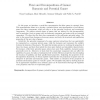Free Online Productivity Tools
i2Speak
i2Symbol
i2OCR
iTex2Img
iWeb2Print
iWeb2Shot
i2Type
iPdf2Split
iPdf2Merge
i2Bopomofo
i2Arabic
i2Style
i2Image
i2PDF
iLatex2Rtf
Sci2ools
114
Voted
CORR
2010
Springer
2010
Springer
Flows and Decompositions of Games: Harmonic and Potential Games
In this paper we introduce a novel flow representation for finite games in strategic form. This representation allows us to develop a canonical direct sum decomposition of an arbitrary game into three components, which we refer to as the potential, harmonic and nonstrategic components. We analyze natural classes of games that are induced by this decomposition, and in particular, focus on games with no harmonic component and games with no potential component. We show that the first class corresponds to the well-known potential games. We refer to the second class of games as harmonic games, and study the structural and equilibrium properties of this new class of games. Intuitively, the potential component of a game captures interactions that can equivalently be represented as a common interest game, while the harmonic part represents the conflicts between the interests of the players. We make this intuition precise, by studying the properties of these two classes, and show that indeed t...
CORR 2010 | Education | Harmonic | Harmonic Games | Potential Games |
Related Content
| Added | 09 Dec 2010 |
| Updated | 09 Dec 2010 |
| Type | Journal |
| Year | 2010 |
| Where | CORR |
| Authors | Ozan Candogan, Ishai Menache, Asuman E. Ozdaglar, Pablo A. Parrilo |
Comments (0)

